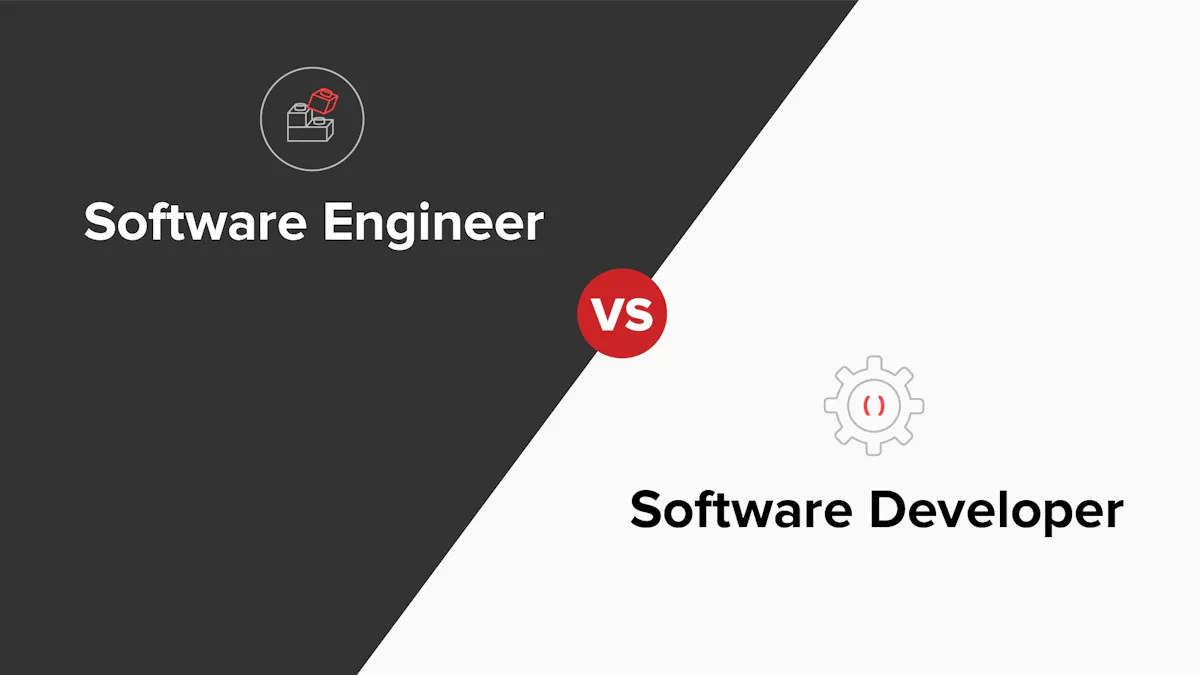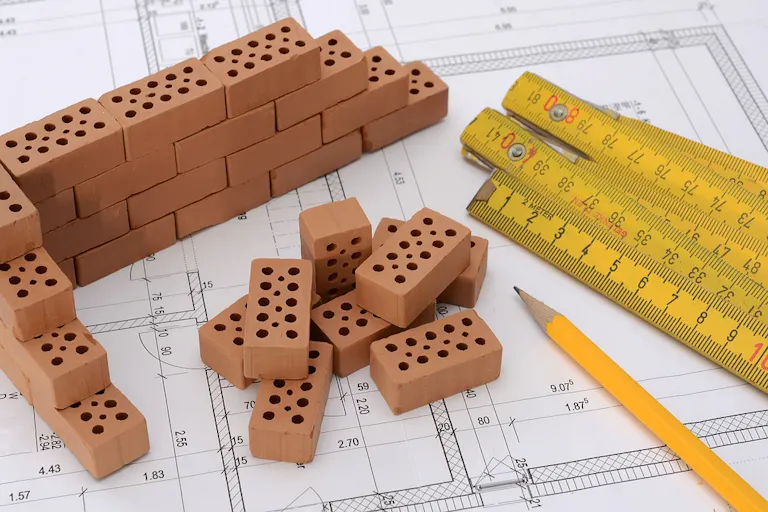Fill out the form to get more information about the Fullstack Academy bootcamp of your choice.
11.16.2023
Software Engineer vs. Software Developer—What’s the Difference?
By The Fullstack Academy Team

Last updated 11/16/2023
In the world of software creation, the job titles of software engineer and software developer are often used interchangeably. Even the Bureau of Labor Statistics makes no distinction, placing these two roles into the same category in the occupational outlook handbook.
However, most IT industry insiders know that software engineers are not quite the same as software developers. The difference between these two roles lies in the engineering training required, the scope of the job function, and, in many cases, the authority level.
Continue reading to understand the subtleties of the software engineer vs. software developer divide.
Software Engineer vs. Software Developer: Key Differences

Software engineers and developers often work hand-in-hand to develop applications, but they each play a unique role and have different responsibilities. Here are a few main differences between software engineers and software developers:
Software developers are responsible for ensuring software functions as it should. Software engineers work to ensure the software meets the needs and requirements of the client.
Software engineers typically work collaboratively, but software developers often work independently.
In most cases, software engineers will typically work on the entire product lifecycle, while software developers will focus on one part of the project.
Software engineers work on a much larger scale, so they must be more methodical to achieve the specific requirements of the software. Software developers have more room for creativity since their role is to build and execute a software solution.
What’s a Software Engineer?
The key word in this job title is “engineer.” According to Engineer’s Edge, “Engineering is the discipline, art, and profession of acquiring and applying scientific, mathematical, economic, social, and practical knowledge to design and build.”
When it comes to software, an engineer is responsible for the entire product development life cycle. This means the engineer notices a need (or is given a problem) and designs a holistic solution, including all its interconnected components. Before starting their design, they consult with stakeholders and gather project requirements.
To develop the technical expertise needed for this profession, software engineers either complete a bachelor’s degree in computer science or a related engineering discipline or graduate from a coding bootcamp.
Engineering Principles
There is no book of universal engineering principles that all engineers use in their design. Instead, each engineer may define their own principles and apply them to each software solution in its specific environment.
Many software engineering teams do, however, subscribe to what’s known as the 12 principles of agile development or some variation of them. These are the original principles as laid out in the Agile Manifesto:
Ensure that the highest priority is to satisfy the customer through early and continuous delivery of valuable software.
Welcome changing requirements and harness the power of change for the customer’s competitive advantage.
Deliver software in frequent cycles.
Maintain stakeholder collaboration, including IT and business teams, throughout the project.
Build a culture of trust, motivation, and support to get the job done.
Convey information via face-to-face communication where possible.
Measure progress primarily through working software.
Build development processes that are efficient to the point of indefinite sustainability.
Pay continuous attention to technical excellence.
Prioritize simplicity—the art of maximizing the amount of work not done.
Remember that the best architectures, designs, and requirements emerge from self-organizing teams.
Reflect regularly as a team on how to be more efficient.
Software Engineer Job Description
Even in job descriptions, the terms “software engineer” and “software developer” are sometimes used interchangeably, but a deeper dive into the job description itself should reveal which of these two roles an organization is hiring for. Here are some of the skills, qualifications, and responsibilities you may find in a software engineering job description.
Software Engineer Skills and Qualifications
Experience creating and maintaining IT architectures and databases
Problem-solving skills
Pattern design and experience with cloud-based infrastructure
Embedded development/debugging experience
Experience with multi-core CPU or SMP
Knowledge of multiple programming languages, including C/C++
Software Engineer Responsibilities
Design, develop, unit-test, and maintain embedded networking software
Work closely with the QA team in developing test plans
Liaise with product marketing and customer success teams
Work across teams to provide technical guidance and support the entire development process of the product

Software Engineering Careers
A career in software engineering can include different specialties. Here are a few examples of potential roles in software engineering:
Front-End Engineer: These software engineers build the user interface for websites and applications.
Back-End Engineer: Direct opposites of front-end engineers, back-end engineers work on the server side of websites and applications.
Full Stack Engineer: These software engineers combine the skills of front-end and back-end engineers to work on both sides of the application.
DevOps Engineer: Short for “development and operations,” DevOps engineers oversee code release and deployment of applications.
Data Engineer: These engineers specialize in storing, managing, and analyzing data to find insights and help make informed business decisions.
Ready to break into tech?
Learn the #1 programming language in 12 to 28 weeks with our live online coding bootcamp.
What’s a Software Developer?
If a software engineer is the architect, a software developer is the carpenter. They execute plans by programming individual system components and ultimately bringing the solution to life.
In general, developers are not responsible for designing the whole system. Instead, they focus on a single project as a part of the whole. They rely on informal methods more than math and science principles to build a software solution. They don’t need to prove the viability of their design with empirical evidence and are given more creative reign in building the software as they see fit.
Whereas engineers design, liaise, and oversee the project, software developers write code to bring the project to life.

Software developers must analyze the software requirements given to them and determine how to build specific functions of the system. They should possess a mastery of at least one front-end or back-end programming language and be familiar with agile development practices and test-driven development.
During the build process, software developers will likely work closely with graphic designers, customer representatives, product managers, senior managers, and decision-makers. And because building software is an iterative process with changing requirements, developers must have good communication skills and be receptive to feedback from all these team members (and from users).
Software Developer Job Description
Developers usually perform a specific function within the larger IT system and may specialize in a certain development framework to complete that function. These specialties are reflected in job posts, with companies posting ads for roles like “Back-End Java Developer” or “Front-End React Developer.”
These are some of the skills, qualifications, and responsibilities that may be found within a software developer job description.
Software Developer Skills and Qualifications
Ability to write clean, maintainable code
Expertise in Javascript, ReactJS, AngularJS, and jQuery
Experience building the front-end of applications with ES2015+, NodeJS, jQuery, HTML5, and CSS3
Experience in front-end tooling and workflows with Git and/or Grunt/Gulp
Experience in responsive web design
Understanding of cross-browser compatibility
Software Developer Responsibilities
Contribute to continual improvements of the UI architecture
Explore cutting-edge front-end technologies to create new innovative features
Build tools for improving internal productivity
Participate in rapid iterative prototyping based on project requirements
Collaborate with designers, front-end engineers, product managers, and QA engineers to maintain a quality UX
These are some of the skills, qualifications, and responsibilities that may be found within a software developer job description.
Software Developer Careers
If you’re interested in becoming a software developer, there are a variety of careers to choose from. Here are a few of the most popular career paths.
Web Developers: Help maintain and optimize websites by ensuring that the code is updated and functioning correctly.
Front-End Developer: Like a front-end engineer, front-end developers design user interfaces of websites and applications.
Back-End Developer: Work on the back-end of websites and applications to build mechanisms that process data and perform actions.
Mobile Developer: Create software for mobile devices, such as smartphones and tablets.
Software Architect: This role is focused less on coding and more on developing systems that other developers will use.
How to Become a Software Engineer or Software Developer
There are many pathways to becoming a software engineer or developer, including enrolling in a coding bootcamp. At Fullstack Academy, we offer live online full-time and part-time coding bootcamps led by industry-experienced instructors. We also offer the Grace Hopper Program Coding Bootcamp for women and non-binary students. Regardless of which program you choose, you’ll gain in-demand skills and knowledge through hands-on learning and real-world experiences
Ready to launch a career as a software engineer or developer? Apply today!


